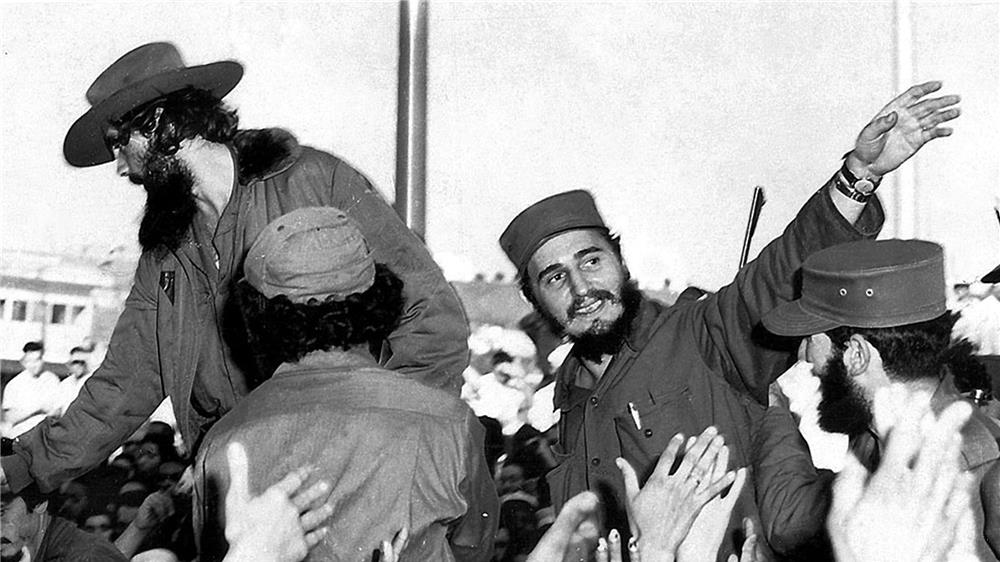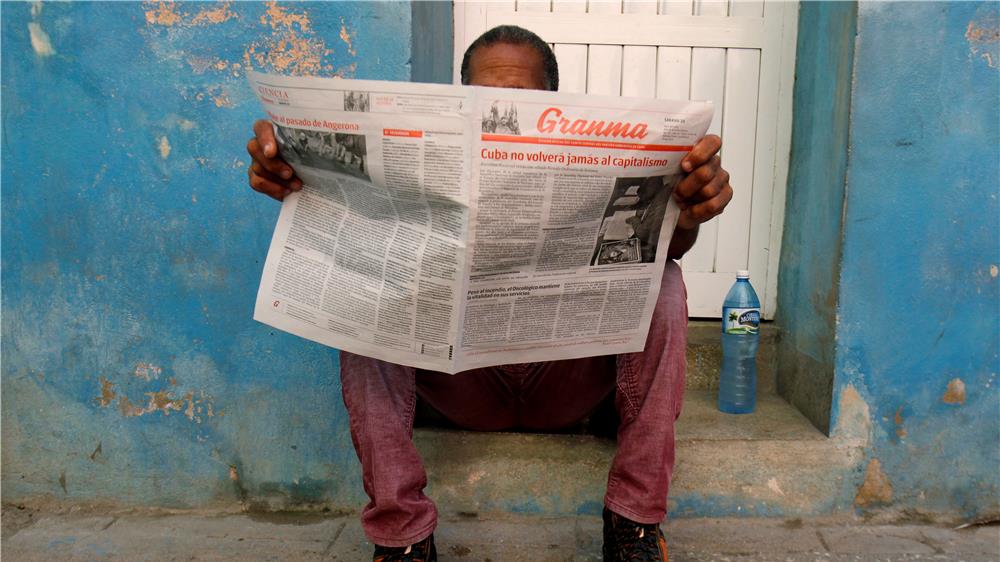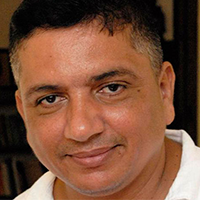عام 1969، وبعد انتصار الثورة في كوبا، تغيّر الخطاب الصحفي كليا وخضعت جميع وسائل الإعلام لسلطة الدولة الاشتراكية التي عرفت كيف تسيطر على كل من يمارس هذه المهنة عبر اتحاد الصحفيين، لتفرض رقابتها وسيطرتها على المعلومات والتقارير. أُنشئت أيضا وكالة المعلومات الدولية (AIN)، وأحكمت سيطرتها على الأخبار الصحفية، واحتكرت الثورة الوليدة وسائل الإعلام والنشر.
وفي العقود الأخيرة، حدثت حرب معلوماتية قسمت الصحفيين إلى مجموعات، فبرز صحفيون محترفون قرروا العمل باستخدام وسائل الإعلام البديلة التي لا توافق أهواء الحكومة في الجزيرة (كوبا). وحدث تدفق في المعلومات عبر شبكة الإنترنت تهاجم، بل وتحاسب ثورة فيدل كاسترو.

زعزعة الرأي العام
مدونون مثل يوواني سانشيس، استطاعوا زعزعة الرأي العام وخلق حالات من الرأي العالمي مختلفة عن الآراء التي تحتل عناوين الصحف الرسمية، مثل "هوبينتودري بيلدي" و"غرانما"، والأخيرة تنتمي إلى الحزب الشيوعي وتتكون من ثماني صفحات فقط. وكانت مهنة الصحافة قد تراجعت في كوبا، واستُهلك وعي الصحفيين الذين يئسوا من حل مشاكل مجتمعهم بسبب وجودهم وسط حرب فكرية شعواء بين كوبا والولايات المتحدة.
إخفاء بعض المعلومات من قبل الحكومة أو تحريف الأخبار لتناسب وجهة النظر السياسية للنظام، حملت كثيرا من المواطنين على محاولة فهم الأحداث الجارية من وجهة نظر المراسلين "المستقلين" الذين تتوفر لهم مصادر إخبارية مختلفة، كما يحدث في مواقع إخبارية إلكترونية مثل "إلتوكي"، و"أون كوبا"، حيث يحصل الصحفي على راتب أفضل، لكنه في الوقت نفسه يخشى التهديد، كما قال صحفي يعمل في أحد تلك المواقع رفض كشف اسمه. وقد أكد طالب الصحافة إدوارد هيمينيس كلامه قائلا "إن العمل في وسائل الإعلام الموجودة في كوبا محفوف بالمخاطر، ولا يوجد حتى الآن اتصال بشبكة الإنترنت لدى الجميع، رغم أن الأمر قد تحسن في الآونة الأخيرة. لكن مع نشر أخبار مكررة في الصحف المحلية والأخبار المتلفزة، تضيع الديناميكية التي تمتلكها اليومَ البرامجُ الإخبارية في معظم البلدان".
لا مساس بصورة الثورة
لم يعد للثورة الكوبية ذلك الوهج الذي ظلت تحظى به لفترة طويلة، خصوصا مع غياب القائد التاريخي فيدل كاسترو، وحرب أيدولوجية مستمرة ودعاية معادية وحصار دائم إلى جانب وضع اقتصادي صعب، وهي عوامل تمثل كعب أخيل (نقطة ضعف) العملية الثورية. وبالتالي، فقد حرص الإعلام الحكومي على عدم المساس بصورة الثورة في أذهان الكوبيين، عبر بثِّ عدد هائل من البرامج التلفزيونية في وسائل الإعلام مدعومة بمخطط سياسي لصالح النظام الذي لا يترك مجالا لإظهار قصص إنسانية تهزّ صورة الثورة. وأي تعليق من قبل الصحفي في أي مكان عام ضد المبادئ التي تدعم الحكومة الكوبية، يخضع للمساءلة والرقابة من قبل اتحاد الصحفيين، الذي يفرض استراتيجية صارمة ضد "الصحفيين الناشئين" ممن يستخدمون الصحافة لانتقاد الثورة.
الرئيس الكوبي الحالي ميغيل دياس كانيل صرح خلال مؤتمر الصحفيين الأخير في يوليو/تموز الجاري، بأن الصحفيين "كان لهم الدور الأكبر في الحفاظ على صوت الأمة في الظروف والأوقات الصعبة، بالولاء المثير للإعجاب، والشعور العالي بالمسؤولية، والموهبة والذكاء والحماسة التي ولّدت دوما مقترحات مهمة.. لم نكن نتوقع ولا ننتظر أقل من ذلك من أولئك الذين يفتخرون بالانتماء إلى نقابة تشرفت منذ تأسيسها بانضمام مفكرين إليها بحجم خوسيه مارتي وفيدل كاسترو وأسماء قادة آخرين بارزين من الثورة".
وقد ألقى كانيل خطابه للصحفيين في إطار هذا اللقاء الضخم لتأييد "صحافة المواطن". مع هذا، فإن التصلب في النهج الذي يسلكه النظام وإخفاء الكثير من الأخبار والتضييق على الحريات، أمور تهدد المراسلين الصحفيين في كوبا الذين غاب كثير منهم عن حضور ذلك المؤتمر.
إلى أي فكرٍ تنتمي؟
يتعلق الأمر إذًا بمعرفة مع أي الأطراف أنت؟ وما هو انتماؤك الفكري؟ إن كنت تتبع الخط الصارم للمؤسسة وتعمل مع وسائل إعلام الدولة الاشتراكية لتكرار ونشر الأخبار المصدَّق عليها مسبقا، والتي تمجّد الثورة الكوبية؟ أو أن تكون على الجانب الآخر وتحديدا مع أولئك الذين انعزلوا لأنهم لم يجدوا منطقا في صحافة فارغة المعنى، لتقرر العمل "باستقلالية" رغم المخاطر والتهديدات المبطنة؟
إن نضال الكوبيين كي يتمكنوا من استخدام شبكة الإنترنت التي تحسنت في السنوات الأخيرة ولو ببطء، والمشاكل الاجتماعية الكبيرة التي تعاني منها الثورة، هي أسباب مطروحة للنقاش في قطاع الصحافة، بيد أنها لم تكن موضع نقاش في ذلك المؤتمر.
ثمة عبء سياسي كبير في كوبا اليوم، يستهلك عمل الصحفي ويضيف له مهمة صعبة تتمثل في "تحليل نوايا النظام في نقل بعض الأخبار للناس".. أمر يجعل المواطن العادي حجرا في رقعة شطرنج، لا يمتلك ما يخوله للوصول إلى حكم ناقد منطقي من خلال ما يصله من أخبار من أكثر من طرف، وفي كثير من الأحوال، يجهل تماما ما يحدث.

آخر من يعلم!
في كثير من الأوقات، يعرف الكوبيون الأخبار أولا من الإنترنت قبل وسائل الإعلام المحلية، ويعطينا طالب الصحافة إدوارد هيمينيس مثالا على ذلك، حين يُخبرنا أن رياضيا كوبيا كان قد سافر إلى بلد أجنبي ضمن منافسة رياضية، لكنه تخلى عن المنافسة ليبقى في ذلك البلد رافضا العودة إلى كوبا.. "كنا قد اعتدنا متابعة ذلك الرياضي باستمرار على وسائل الإعلام الكوبية خلال نشاطات محلية ودولية، وحين تخلى عن المنافسة وبقي في البلد الآخر، عرفنا ذلك عن طريق الإنترنت، بينما لم تتحدث عنه وسائل الإعلام المحلية إلا باختصار شديد ودون تفاصيل".
أبعد من ذلك، انقسمت توقعات الصحفيين في كوبا حين سلم الزعيم الكوبي الراحل فيدل كاسترو السلطة لأخيه راؤول كاسترو قبل عقود، وأيضا حين سلّمها الأخير للرئيس الحالي ميغيل دياس كانيل، إذ كان الصحفيون والناس عامة مغيَّبين تماما عما يحدث في أروقة النظام.








































